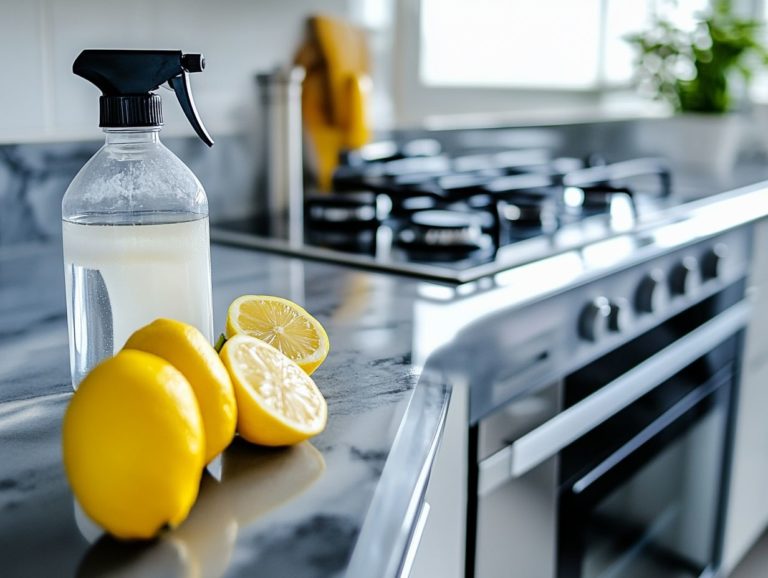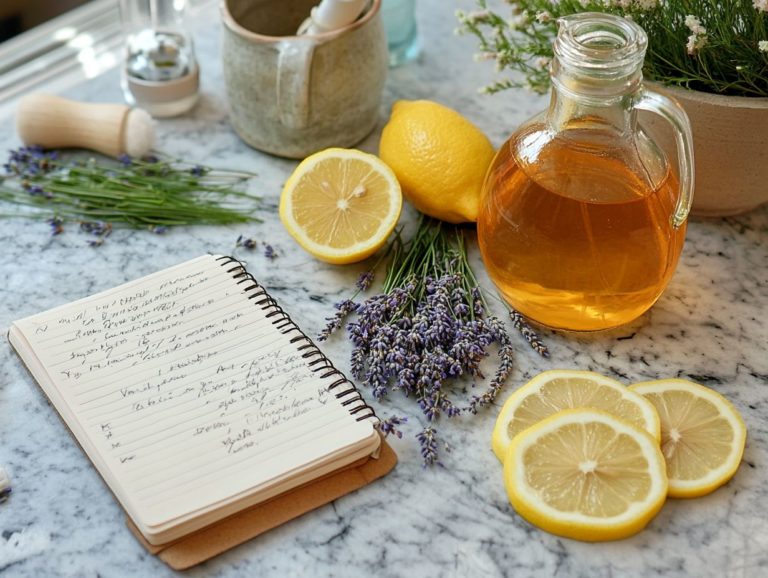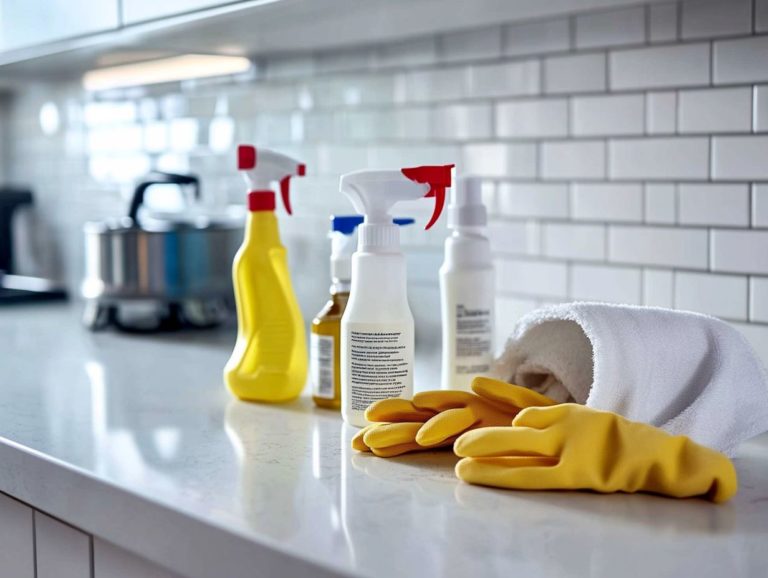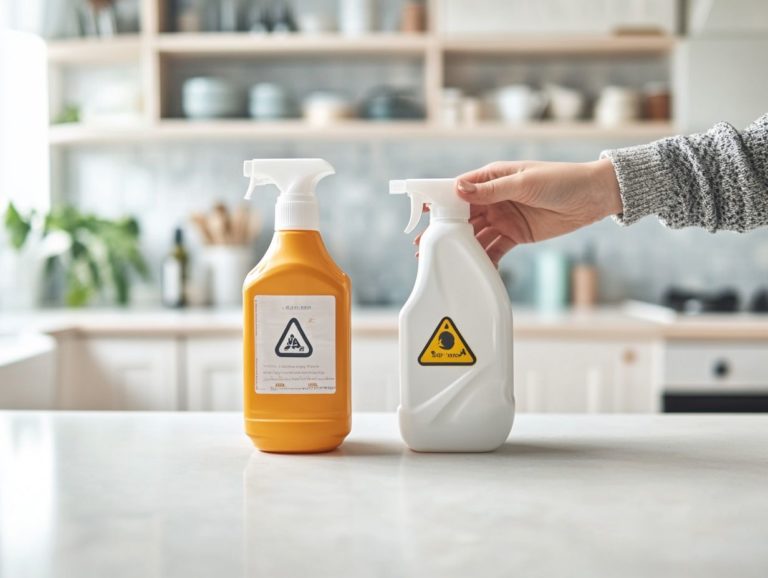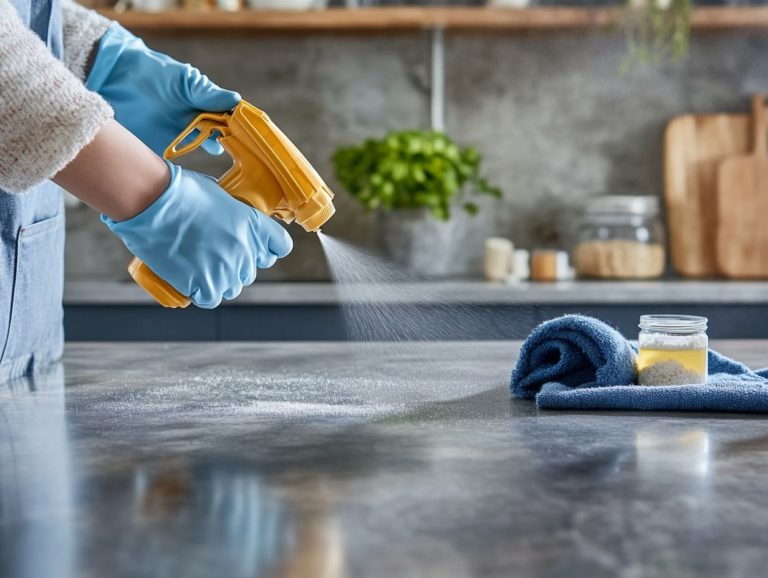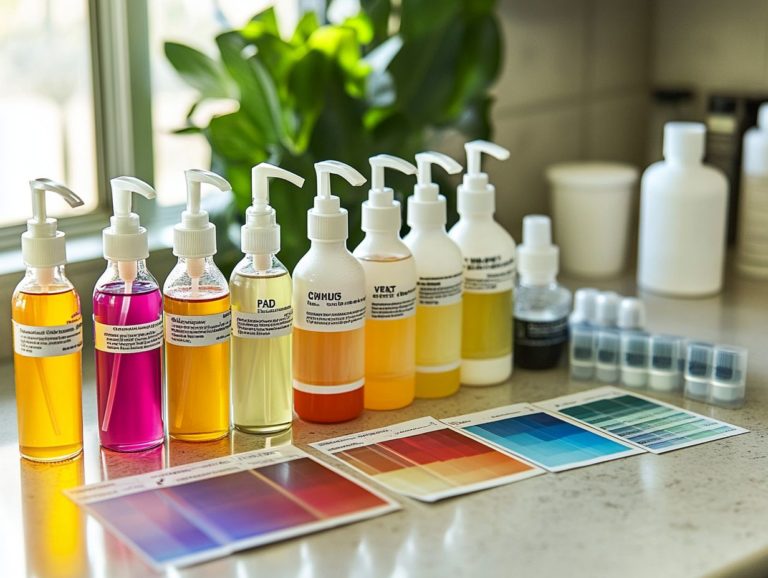What is the Most Effective Natural Disinfectant?
In a time when cleanliness and safety are at the forefront of our concerns, understanding the importance of using effective disinfectants in your daily routine is more crucial than ever.
This article delves into the world of disinfectants, emphasizing natural alternatives that not only get the job done but are also gentler on your health compared to chemical disinfectants.
You ll explore the science behind how these agents operate and uncover the advantages of opting for natural solutions over harsh chemicals. With a comprehensive guide to various types of disinfectants, DIY recipes, and effective usage tips, you re set to transform your cleaning routine.
Embrace the power of nature to keep your spaces pristine and healthy!
Contents
- Key Takeaways:
- What are Disinfectants?
- What are Natural Disinfectants?
- What Makes a Natural Disinfectant Effective?
- What are the Benefits of Using Natural Disinfectants?
- What are the Most Effective Natural Disinfectants?
- DIY Natural Disinfectant: Clean and Green!
- How to Use Natural Disinfectants Effectively?
- Frequently Asked Questions
- What is the Most Effective Natural Disinfectant?
- Are there any natural disinfectants that can replace chemical cleaners?
- How does vinegar work as a natural disinfectant?
- Can essential oils really disinfect surfaces?
- What are the benefits of using natural disinfectants?
- Where can I find natural disinfectant products?
Key Takeaways:
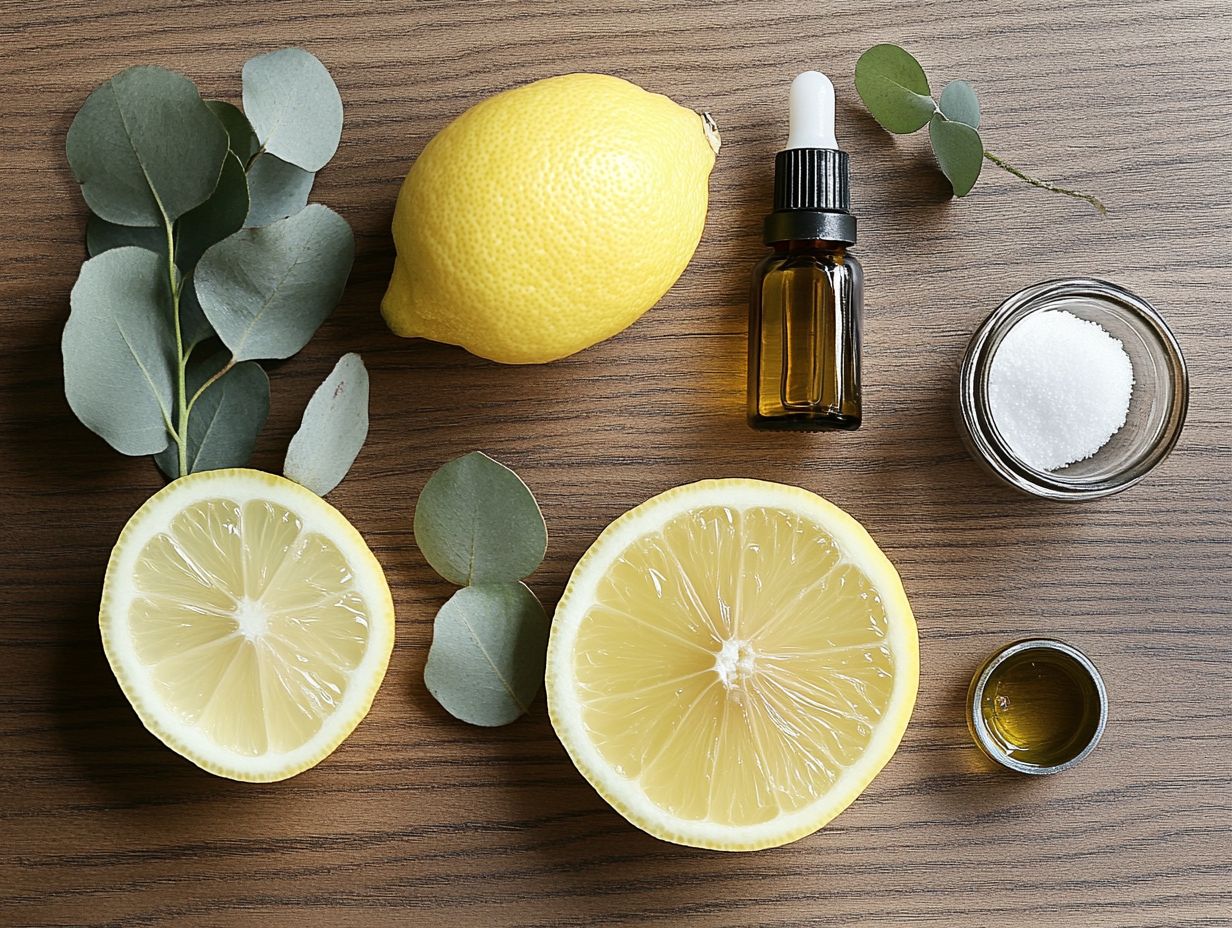
- Choose natural disinfectants for a safer, healthier home!
- Vinegar, hydrogen peroxide, tea tree oil, citrus extracts, and essential oils are some of the most effective natural disinfectants.
- You can quickly whip up your own effective natural disinfectant solutions at home using simple ingredients like water and vinegar or lemon.
What are Disinfectants?
Disinfectants are specialized cleaning agents designed to eliminate harmful microorganisms, including bacteria and viruses, from various surfaces in your home and workplace. They are essential for maintaining a hygienic environment, particularly in high-touch areas like kitchens and bathrooms. Products like Bissell SteamShot can enhance the effectiveness of these disinfecting efforts.
More people are focusing on health and the environment, making the use of disinfectants essential for effective home care. You can choose between chemical disinfectants and natural options such as vinegar, lemon, peppermint, or hydrogen peroxide, depending on your specific needs and preferences.
Understanding how these agents work is crucial for ensuring their safe and effective use.
How do Disinfectants Work?
Disinfectants operate by employing various chemical compounds that disrupt the cellular structure of microorganisms, effectively eliminating germs and halting their spread on household surfaces. For instance, rubbing alcohol is commonly used in many household cleaners due to its germ-killing properties.
These cleaning solutions utilize a variety of active ingredients, each crafted with specific antimicrobial properties (ability to kill germs) to target different pathogens, including bacteria, viruses, and fungi. For example, alcohol-based disinfectants work by denaturing proteins and dissolving lipids, while bleach releases free chlorine that interacts with cellular components, ensuring thorough sanitation. Sodium percarbonate is another effective disinfectant found in some cleaning products.
The effectiveness of these agents can vary considerably based on the microorganism in question; some disinfectants may excel at combating certain viruses while being less effective against bacterial spores. Therefore, it is essential to adhere to application guidelines set by organizations like the EPA. Proper dilution and adequate contact time are vital for achieving optimal results and ensuring safe use in your environmental disinfection efforts.
What are Natural Disinfectants?
Natural disinfectants serve as eco-friendly cleaning agents sourced from nature, effectively combating germs and bacteria on various household surfaces without the harsh effects associated with chemical disinfectants. Brands like Seventh Generation are well-known for producing environmentally friendly cleaning products.
You ll find familiar options like vinegar, hydrogen peroxide, and essential oils such as tea tree and lavender, all renowned for their antimicrobial properties. These alternatives not only provide effective disinfecting solutions but also resonate with your commitment to environmental protection, making them perfect for health-conscious households.
By grasping the potential benefits and limitations of natural disinfectants, you enable yourself to make informed choices about the cleaning products you use.
How are Natural Disinfectants Different from Chemical Disinfectants?
Natural disinfectants set themselves apart from chemical disinfectants primarily through their composition and approach to germ elimination. The former is derived from plant-based or natural substances, while the latter often contains synthetic chemicals that are registered with the EPA.
Products like Castile soap and sodium percarbonate are commonly used in natural disinfectants. Understanding these distinctions is crucial for effective cleaning and ensuring safety in both your home and commercial settings.
Natural disinfectants, like vinegar and tea tree oil, harness the power of compounds with antimicrobial properties. In contrast, chemical disinfectants typically rely on potent agents such as bleach and other strong cleaners. This affects how well they work against certain germs; for example, certain viruses may be more readily eradicated by chemical options.
Notable sources like Good Housekeeping and Real Simple have highlighted these distinctions in their cleaning guides. Natural alternatives are generally safer and pose fewer health risks, such as skin irritation or respiratory issues.
From an environmental perspective, natural disinfectants tend to break down more easily and pose less harm to aquatic ecosystems compared to their chemical counterparts. Experts like Amanda Garrity and Carolyn Fort from Good Housekeeping often advocate for the use of natural cleaning solutions.
What Makes a Natural Disinfectant Effective?
The effectiveness of a natural disinfectant largely depends on its active ingredients and their antimicrobial properties. These agents effectively combat harmful microorganisms on household surfaces. For instance, a mixture of hot water and vinegar can be a very effective disinfectant.
Ingredients such as vinegar, hydrogen peroxide, and essential oils like tea tree and lavender have demonstrated impressive germ-killing capabilities. Many household cleaners combine these ingredients to enhance their effectiveness.
You ll be amazed at how understanding the right natural disinfectants can transform your cleaning routine! It’s essential to know the specific concentrations and combinations needed to achieve optimal results. By gaining insight into which natural disinfectants are most effective for particular applications, such as using peppermint oil for surface cleaning, you can significantly enhance your home care routines.
What are the Different Types of Natural Disinfectants?
You ll find that various natural disinfectants offer a range of effective solutions. Versatile agents like vinegar, hydrogen peroxide, and essential oils each boast unique properties that combat germs effectively. For example, using acetic acid found in vinegar can be particularly potent in certain applications.
These options not only contribute to a cleaner environment but also present safer alternatives to harsh chemical cleaners. Take vinegar, for example; its acetic acid content makes it superb for cutting through grime, especially in the kitchen. Just keep in mind that it may not be suitable for all surfaces, particularly natural stone, due to its acidity.
Then there s hydrogen peroxide, a formidable disinfectant that works well on a variety of surfaces. Its potency wanes when exposed to light. Essential oils, such as tea tree oil, bring the added benefit of delightful fragrances along with their antimicrobial properties, but remember that they often need to be diluted before use to avoid any irritation.
For instance, Castile soap combined with essential oils can create an effective and fragrant cleaning solution. By understanding these options, you enable yourself to select the ideal natural disinfectant tailored to your specific needs.
Brands like Seventh Generation provide product lines that cater to various cleaning requirements using natural ingredients. Explore our range of natural cleaning solutions today!
What are the Benefits of Using Natural Disinfectants?
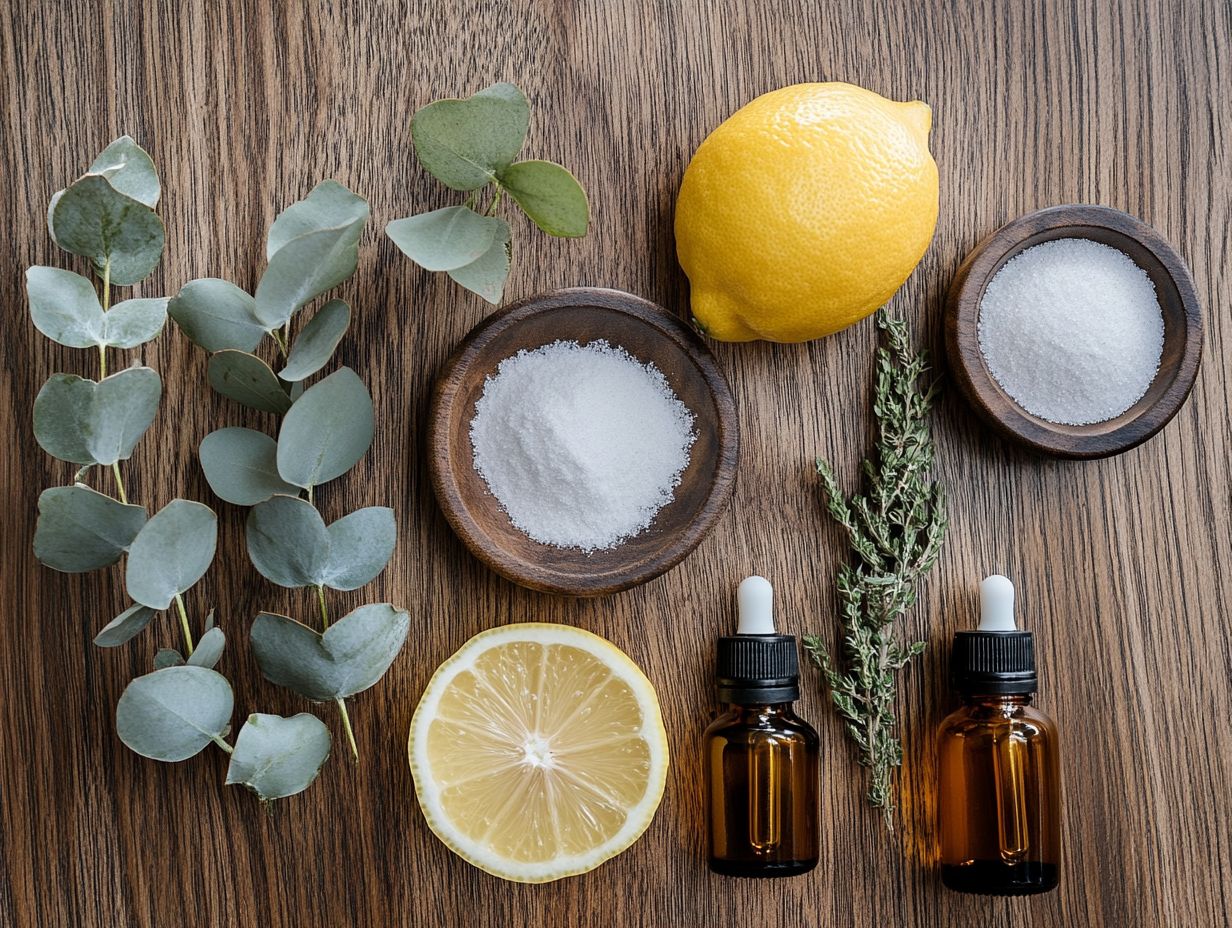
Using natural disinfectants provides many benefits for the environment and human health. These cleaners help maintain a healthier living space.
They are made from safe ingredients, which lowers the risk of chemical exposure. They effectively target and reduce harmful bacteria and viruses on surfaces, with natural hydrogen peroxide and vinegar being prime examples.
This approach not only creates a healthier living space but also promotes a sustainable future. Thorough cleaning with these agents can enhance your overall well-being.
Are Natural Disinfectants Safer to Use?
Natural disinfectants are often safer alternatives to chemical products. They avoid harsh synthetic chemicals, reducing health risks for you and your pets.
Many natural products use plant-based ingredients to eliminate germs effectively. Common examples include vinegar, tea tree oil, hydrogen peroxide, and lavender, known for their antibacterial properties.
You should remain vigilant by scrutinizing labels carefully. Some natural products may contain additives that aren’t as harmless as they seem. Checking for the Good Housekeeping Seal can help you find safe and effective products.
Do Natural Disinfectants Have Any Health Benefits?
Natural disinfectants, like essential oils, do more than tackle germs; they improve air quality and provide soothing aromas. Cleaning with products that contain essential oils like lavender and peppermint makes the routine more enjoyable.
Choosing these natural alternatives significantly reduces harmful chemicals found in conventional cleaners. When you opt for plant-based disinfectants, you may experience fewer allergic reactions.
Essential oils like lavender, peppermint, and eucalyptus purify your environment and offer therapeutic properties. Incorporating them into your cleaning routines fosters a healthier living space, allowing you to breathe easier.
What are the Most Effective Natural Disinfectants?
Effective natural disinfectants include vinegar, hydrogen peroxide, tea tree oil, and citrus extracts. Each has unique germ-fighting properties and is versatile for various cleaning applications.
1. Vinegar
Vinegar is a natural disinfectant that kills many germs and is safe for your home. It’s a staple in your household and doubles as a remarkably effective cleaner, thanks to its acetic acid content.
This versatile liquid works well for many cleaning tasks, from disinfecting kitchen counters to sanitizing bathroom fixtures. For optimal results, mix one part vinegar with one part water. This dilution maintains strong germ-fighting ability while being gentle enough for most surfaces.
Add lemon juice for an extra boost in antibacterial effectiveness. While vinegar is non-toxic and environmentally friendly, its potent aroma can be strong. Never mix vinegar with bleach, as this combination produces harmful gases.
To ensure a safe cleaning experience, work in a well-ventilated area and wear protective gloves. For more household surfaces to clean naturally, consider using vinegar and hot water together.
2. Hydrogen Peroxide
Hydrogen peroxide is incredibly effective for disinfecting a range of surfaces, from countertops to cutting boards. It has strong germ-fighting properties and is recognized by EPA registered standards.
This compound works by releasing oxygen as it breaks down, eliminating bacteria, viruses, and fungi. You can dilute it with water using common ratios of 1:1 or 1:10, depending on how deep of a clean you desire.
Mixing hydrogen peroxide with essential oils like tea tree oil can further enhance its germ-killing efficiency. While concentrated solutions can irritate skin and eyes, common household concentrations (around 3%) are safe for most uses.
Incorporating this natural solution into your cleaning routines helps maintain hygiene while reducing exposure to harsh chemicals typically found in traditional disinfectants.
3. Tea Tree Oil
Tea tree oil is a powerful essential oil known for its natural disinfectant properties. It effectively eliminates bacteria and fungi while leaving a refreshing scent in your cleaning solutions.
This oil is a key component in many home care and cleaning solutions, including those endorsed by Seventh Generation and Real Simple. Scientifically, it is known as Melaleuca alternifolia and is effective against pathogens like Staphylococcus aureus and Candida albicans.
Using tea tree oil with rubbing alcohol can elevate its effectiveness for cleaning applications. It can also be incorporated into personal care products like hand sanitizers and skincare routines, enhancing both hygiene and skin health.
While it is generally safe for topical use, remember to dilute it properly and perform a patch test, especially if you have sensitive skin. For the environmentally conscious, tea tree oil offers a green alternative to traditional chemical disinfectants.
Don’t miss out on using these powerful cleaning agents! Start cleaning naturally today and see the difference!
4. Citrus Extracts
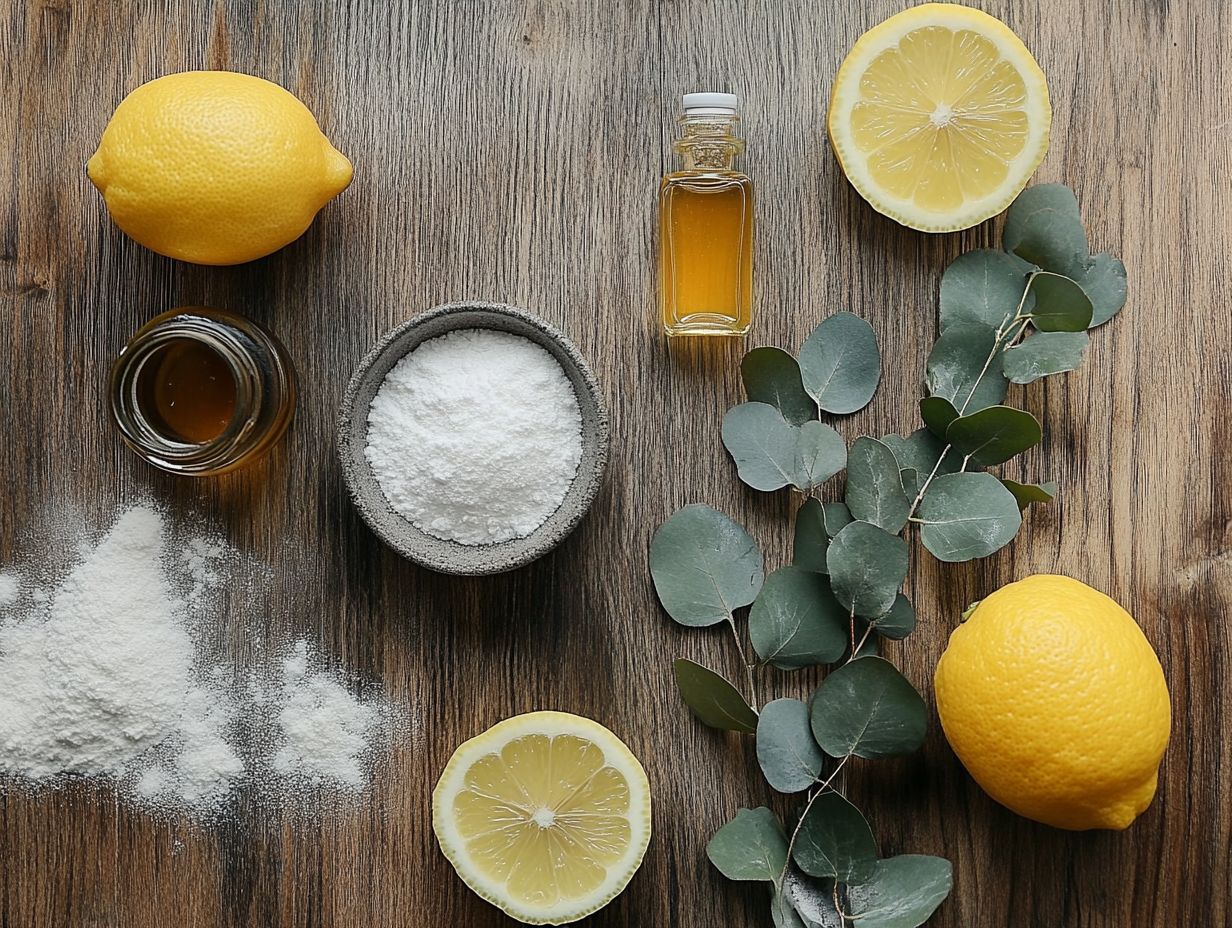
Citrus extracts come from fruits like lemons and oranges. They make great natural disinfectants because they are acidic and fight germs.
These extracts are packed with active ingredients like limonene and citric acid, which help fight germs effectively. Limonene dissolves oily residues, while citric acid disrupts the cell membranes of bacteria and viruses. When combined with vinegar and lemon, these extracts create a powerful disinfectant that keeps surfaces sparkling clean!
This means that not only are these natural alternatives highly effective, but they also bring a delightful aroma to your cleaning routine. Use them with confidence wherever you clean your home deserves the best! You can use them in kitchens, bathrooms, or even commercial spaces, providing a safe yet powerful solution for maintaining hygiene without resorting to harsh chemicals. For deeper cleans, devices like the Bissell SteamShot can pair well with citrus extract solutions.
DIY Natural Disinfectant: Clean and Green!
Crafting your own natural disinfectant is a fun and cost-saving way to keep your home clean. You can leverage the potent properties of ingredients such as vinegar, hydrogen peroxide, and essential oils.
1. Vinegar and Water Solution
You can easily prepare a simple vinegar and water solution by mixing equal parts of distilled white vinegar and water. This creates an effective natural disinfectant for your everyday cleaning tasks.
This versatile solution does more than just tackle germs and bacteria; it also breaks down grime on various surfaces throughout your home. When applying this mixture, use a spray bottle for even distribution, allowing the acidic properties of the vinegar to work their magic on countertops, windows, and bathroom tiles.
However, exercise caution: this solution is not suitable for natural stone surfaces like granite or marble, as the acidity might cause damage. For optimal results, let it sit for a few minutes before wiping it away to ensure maximum effectiveness in disinfection.
To elevate the experience and enhance the fresh scent, consider adding a few drops of your favorite essential oil to the mixture.
2. Hydrogen Peroxide and Water Solution
To create your own hydrogen peroxide and water solution, mix one part 3% hydrogen peroxide with two parts water. This combination serves as a powerful natural disinfectant perfect for disinfecting surfaces. This method aligns with the recommendations from Good Housekeeping and Amanda Garrity, who emphasize the importance of cleaning methods that are safe for you and your family.
This straightforward yet effective mixture can be utilized in a variety of settings from your home to healthcare facilities to tackle a wide array of pathogens, including bacteria, viruses, and fungi. When applying this solution, ensure that it s used on clean surfaces for maximum effectiveness, allowing sufficient contact time to eliminate germs.
While hydrogen peroxide is generally safe for use, it’s wise to take proper safety precautions: wear gloves to protect your skin and ensure the area is well-ventilated. Remember to store the solution in a dark container, as exposure to light can diminish its potency over time.
Try these recipes today and discover how easy it is to keep your home fresh and germ-free!
3. Tea Tree Oil and Water Solution
You can create a strong natural disinfectant by mixing one teaspoon of tea tree oil with two cups of water. This simple solution uses the germ-fighting properties of tea tree oil, making it a powerful ally in your household cleaning efforts.
This blend effectively tackles a range of cleaning tasks. It eliminates bacteria and fungi from surfaces with ease. You can conveniently apply the solution using a spray bottle, allowing you to target high-germ areas like kitchen counters and bathroom fixtures effortlessly. This mixture also works as a skin treatment for minor cuts and insect bites, helping you heal quickly!
Whether you’re sprucing up your home or tending to personal care needs, this versatile concoction fosters a healthier living environment and has become a staple in many households.
4. Citrus Extract and Water Solution
To create a citrus extract and water solution, simply combine the juice of one lemon or orange with two cups of water. This mixture results in a refreshing and effective natural disinfectant for your household. Experts recommend this method as one of the best practices for natural cleaning products, as highlighted by Seventh Generation and Real Simple.
This straightforward preparation taps into the natural antibacterial properties of citrus fruits, which are rich in citric acid a natural substance found in citrus fruits that helps break down grease and grime effectively. After mixing your ingredients, allow the solution to sit for a few minutes; this enhances its effectiveness before you put it to use.
For application, a spray bottle is your best friend. It ensures even distribution across countertops, cutting boards, and other surfaces, making your cleaning tasks seamless. Not only does this method offer a safe alternative to harsh chemicals, but it also infuses your living space with a pleasant, invigorating scent.
You can have complete confidence in its efficacy, as citrus extracts have proven effective against a range of bacteria. This solution is perfect for anyone wanting a more eco-friendly way to clean. It aligns with guidelines for environmental protection and effective home care.
How to Use Natural Disinfectants Effectively?
To use natural disinfectants effectively, you need to grasp the proper techniques and approaches that maximize their germ-killing potential on different household surfaces. This understanding will ensure that you achieve the best results in your cleaning routine, elevating your effectiveness and contributing to a healthier home environment. For a thorough clean, combining soap and water with natural disinfectants can be particularly effective.
Frequently Asked Questions
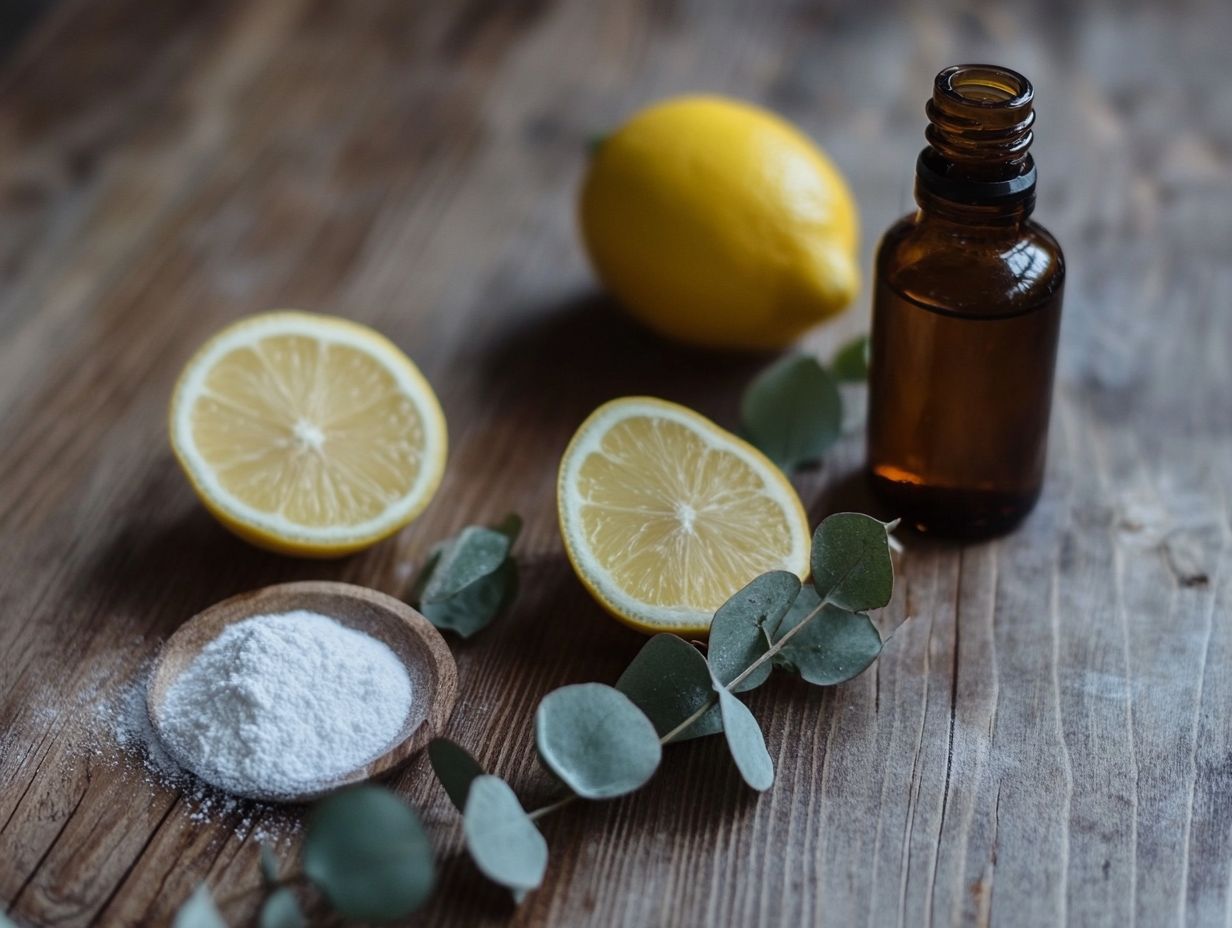
What is the Most Effective Natural Disinfectant?
The most effective natural disinfectant is one that is non-toxic, yet still powerful enough to kill harmful bacteria and viruses. It should also be easily accessible and affordable for everyday use.
Are there any natural disinfectants that can replace chemical cleaners?
Yes, there are several natural disinfectants that can replace chemical cleaners. Some examples include vinegar, hydrogen peroxide, and essential oils like tea tree and eucalyptus.
How does vinegar work as a natural disinfectant?
Vinegar contains acetic acid, which has antimicrobial properties. It can kill bacteria, viruses, and mold on surfaces. It is also effective at breaking down grease and removing stains.
Can essential oils really disinfect surfaces?
Yes, certain essential oils have strong antimicrobial properties that can effectively kill bacteria and viruses. However, it is important to dilute the oils properly and use them in combination with other natural disinfectants for maximum effectiveness.
What are the benefits of using natural disinfectants?
Natural disinfectants have several benefits, including being safe for the environment, non-toxic for humans and pets, and budget-friendly. They also do not contribute to the development of antibiotic-resistant bacteria like chemical cleaners can.
Act now to create a healthier home with these natural disinfectants!
Where can I find natural disinfectant products?
Discover the world of natural disinfectants! You can find them in retail stores, health food shops, and online.
You can even create your own powerful disinfectant at home using ingredients you already have, such as vinegar, baking soda, and essential oils.

